Fractions
A fraction is a part of a whole
Slice a pizza, and we get fractions:
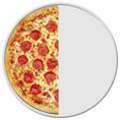 | 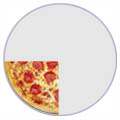 | 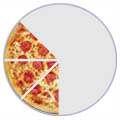 |
| 1/2 | 1/4 | 3/8 |
(One-Half)
|
(One-Quarter)
|
(Three-Eighths)
|
The top number says how many slices we have.
The bottom number says how many equal slices it was cut into.
The bottom number says how many equal slices it was cut into.
Have a try yourself:

Click the pizza →
Slices we have:
Total slices:
"One Eighth"
Slices:
Equivalent Fractions
Some fractions may look different, but are really the same, for example:
| 4/8 | = | 2/4 | = | 1/2 |
| (Four-Eighths) | Two-Quarters) | (One-Half) | ||
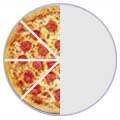 | = | 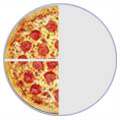 | = |  |
It is usually best to show an answer using the simplest fraction ( 1/2 in this case ). That is called Simplifying, or Reducing the Fraction
Numerator / Denominator
We call the top number the Numerator, it is the number of parts we have.
We call the bottom number the Denominator, it is the number of parts the whole is divided into.
We call the bottom number the Denominator, it is the number of parts the whole is divided into.
| Numerator |
| Denominator |
You just have to remember those names! (If you forget just think "Down"-ominator)
Adding Fractions
It is easy to add fractions with the same denominator (same bottom number):
| 1/4 | + | 1/4 | = | 2/4 | = | 1/2 |
| (One-Quarter) | (One-Quarter) | (Two-Quarters) | (One-Half) | |||
 | + |  | = |  | = |  |
Another example:
| 5/8 | + | 1/8 | = | 6/8 | = | 3/4 |
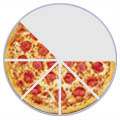 | + | 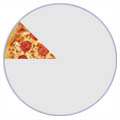 | = | 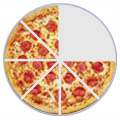 | = | 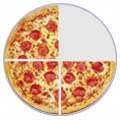 |
Adding Fractions with Different Denominators
But what about when the denominators (the bottom numbers) are not the same?
| 3/8 | + | 1/4 | = | ? | ||
 | + |  | = |  |  |
We must somehow make the denominators the same.
In this case it is easy, because we know that 1/4 is the same as 2/8 :
| 3/8 | + | 2/8 | = | 5/8 | ||
 | + | 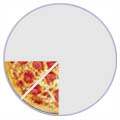 | = |  |  |
But when it is hard to make the denominators the same, use one of these methods (they both work, use the one you prefer):
taken from https://www.mathsisfun.com/fractions.html
No comments:
Post a Comment